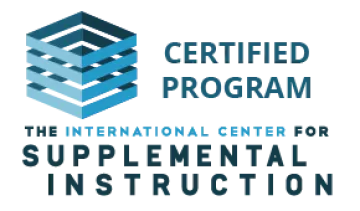Faculty Frequently Asked Questions
About Supplemental Instruction
Supplemental Instruction (SI) is a retention program that targets historically challenging courses. By targeting courses, the SI program is able to assist more students where support is needed most. The model was originally created in 1973 at University of Missouri—Kansas City. Since its creation, the SI model has been extensively reviewed by leading researchers in student development and higher education including the pinnacle investigation by the US Department of Education in 1981 confirming improvements in final course grades, retention and graduation rates between SI users and non-users.

Frequently Asked Questions
Students who attend SI sessions will:
- Review class lectures and develop study skills in a collaborative environment
- Gain a deeper understanding of your course content and lecture emphasis
- Have SI Leaders as positive student role models that often help connect students to their faculty
- Be exposed to various transferable skills they can apply to other courses
- Become part of a learning community within your class, increasing the presence of prepared students in class lectures
SI Leaders will attend every class lecture and model positive student behavior. Faculty have also used SI Leaders to help facilitate in-class activities and proctor exams. SI Leaders do not grade any work as it creates an unbalanced peer effect.
The SI program is designed to support faculty as much as it assists students. At the University of Arizona, most faculty commit no more than one hour per week to meet with SI Leaders. These meetings are typically for faculty to give content direction to their SI Leaders. Some faculty also use this time to develop collaborative strategies to use during class lectures. Faculty with preceptors often include SI Leaders in their preceptor meetings to ensure that their support team is on the same page.
The SI program targets historically challenging courses; these are courses with high (roughly 25% of the class) D, F, W rates. However, we consider each courses needs on a case by case basis. If you are interested in SI for your class or department, please contact Francesca L. Nesfield, Manager, Supplemental Instruction.
Please provide the following information in your request:
- Contact person’s name
- Interested course
- Typical enrollment
- College overseeing the course
Faculty are our primary partners in promoting academic support and developing an SI-attending culture. Successful practices that Arizona Faculty engage in include:
- Allow SI Leaders to make a brief introduction at the beginning of the semester and weekly announcements about SI Sessions throughout the semester
- Meet with SI Leaders on a weekly basis throughout the semester to best align SI session content with course lectures
- Encourage ALL students to attend SI sessions. We are available for everyone, not just students who are struggling with or not understanding course content
- Allow SI Leaders to have D2L access. This allows students to see that SI sessions are a part of the class and the content is related to class lectures
- Include our SI description and schedule in the course syllabus and D2L site
- Allow for SI administrative staff to have access to exam grades to assess correlations between SI users and non-users. This process meets all FERPA requirements and is completed by the administrative staff only
Below is a description faculty can use in their syllabus and D2L site:
Supplemental Instruction (SI) is a FREE service that provides regularly scheduled, out-of-class study sessions. The SI sessions are led by trained students who have previously taken the course and attend every lecture with you. They are well-informed about what's happening in the course and maintain a strong understanding of the course content. SI Sessions—open to all students in the class—review important course concepts, predict and practice test items, develop test prep strategies, and discuss readings.
Faculty Resources
To view information and contacts for other THINK TANK services, please visit the Faculty Connection page.

